Capacity Building
The Partnership’s Internship Program
-
 2018 - 2020
2018 - 2020
-
 -
-
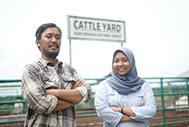
The Partnership develops an internship program which aims to provide stronger pathways to employment in the Indonesian red meat and cattle sector by exposing the interns to firsthand experience in Indonesian cattle industry. From industry point of view, the internship program is valued as an effective mechanism to identify potential employees.
The program started in 2018 with 4 participants and is continuing into 2019 with the target to engage 50 participants that will be selected through a rigorous selection process. The Partnership in collaboration with the Indonesian Society for Animal Husbandry (ISPI) deployed the first 25 interns of RMCP-ISPI Internship Program to 11 companies in the red meat and cattle sector across 5 provinces in Indonesia.
The Skills Development Program Short Courses Phase 2
-
 2018 – 2020
2018 – 2020
-
 -
-
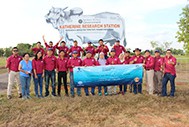
Following the successful implementation of the Skills Development Program Short Courses Phase 1 (see below), in August 2017 the Partnership agreed to extend the program for three years (2018-2020). The program includes:
Commercial Cattle Breeding and Management Course
The course aims to expand the breeding and managerial expertise of organisations in the Indonesian cattle industry. The course also aims to help feedlot companies diversify into cattle breeding
The training program was designed as a practical training, which was aimed to learn practical steps, understand financial viability and link with commercial partners in cattle breeding. The practical training provided technical and financial skills for each production system, facilitating better decision-making and investment, including linkages with Australian industry. It was also aimed to promote commercial linkages between Australia and Indonesia, potentially facilitating investment and business collaboration for mutual benefits. The program was also expected to support participants to expand their professional and practical skills’ base, knowledge and networks in Australia and Indonesia.
Four cohorts of courses have been conducted on 2018 to 2019. All were held in Indonesia for two weeks and one week in Australia. In total, 80 staff from Indonesian feedlots, oil palm plantations that integrate cattle breeding into their operations participated in the training, as well as smallholders enterprises.
Reproduction Management Training Program
Animal health and reproduction play a pivotal role in the success of any cattle management program therefore Partnership identified the need for more specific training of Indonesian veterinarians involved in cattle breeding operations.
The purpose of this program is to equip veterinarians with adequate technical and practical knowledge on reproductive techniques. The Partnership hosted the first intake for its Reproduction Management Training course from 15 July to 19 July 2019.
Facilitated by Bogor Agricultural University (IPB), the training involved classroom-based learning on topics such as animal reproduction, animal health and specific reproduction management within a cattle breeding enterprise.
A total of 17 participants visited the research facility at IPB, as well as making a field trip to PT Lembu Jantan Perkasa in Serang, Banten.
Pregnancy Test Training Program
Veterinary paramedics can play an important role in monitoring reproductive efficiency and detecting problems early in a cow’s pregnancy cycle.
Unfortunately, however, many paramedics in the field lack the skills to conduct proper pregnancy testing processes. A technical training on effective pregnancy test has been identified as an option to improve the technical skills of paramedics
It is envisaged that by the end of the training program, participants can improve their skills and capacity to support the achievement of high reproductive efficiency through effective and accurate pregnancy test in their breeding operations.
The Partnership held its first round of Pregnancy Test Training for Veterinary Paramedics from 5 August to 26 August 2019.
The training was facilitated by the National Artificial Insemination Center (BBIB) in Singosari, Malang, a research facility owned by Indonesia’s Ministry of Agriculture.
There were 15 veterinary paramedics who participated in the training, each selected from various cattle breeding operations, including feedlot companies, integrated cattle and oil palm enterprises, and smallholder farmers groups.
The Skills Development Program Short Courses Phase 1
-
 2015 – 2017
2015 – 2017
-
 -
-
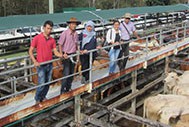
Between 2015 and 2017, the Partnership trained 142 Indonesians in a range of short courses that support skills and capability transfer in the Indonesian government and the red meat and cattle sector. The program reached the entire supply chain, from producers and processors to policy makers responsible for agricultural and trade policy development. The program aims to increase the understanding, knowledge and vocational skills of those working in the industry and government in Indonesia to promote global competencies. Each course was delivered by Australia Awards in Indonesia in collaboration with an Australian institution with significant sectoral experience. These included:
- Producer course - animal husbandry and cattle production (University of New England)
- Processor course – meat production, processing and supply chain management (TAFE Queensland South West)
- Policy course – policy development for livestock production and supply chains (University of Queensland)
- Senior policy course – sharing good practice in the Australian and Indonesian livestock industries (University of Sydney)
Indonesia-Australia Pastoral Industry Student Program
-
 2015 – 2016 (Phase 1)
2015 – 2016 (Phase 1)
2018 – 2020 (Phase 2)
-
 -
-
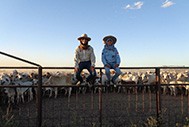
The program provides Indonesian undergraduate agricultural students with a combination of competency-based accredited learning and real industry experience through extensive industry training and placements at selected corporate and family run The program provides Indonesian undergraduate agricultural students with a combination of competency-based accredited learning and real industry experience through extensive industry training and placements at selected corporate and family run cattle stations in the Northern Territory. It builds capacity, knowledge and understanding of animal husbandry, production and welfare issues in the entire supply chain and production environment between the Australian and Indonesian cattle trade. To date, 70 Indonesian students have been trained under the program.
Two batches of NIAPP Phase 2 have been implemented between July – September 2018 and August – October 2019, 40 students from throughout Indonesia were selected to be placed at Northern Territory cattle stations. The program concludes with a reciprocal visit of Australian host stations to Indonesia; and follow up session on alumni program. For more information, visit the NTCA website.
Development of Standard Operating Procedures (SOPs) in Indonesian Abattoirs
-
 2015 – 2016 (Completed)
2015 – 2016 (Completed)
-
 -
-
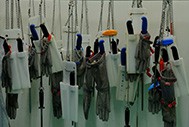
This project is focused on translating and facilitating the development of SOPs of practical hygiene standards and hygienic production of meat in Indonesian abattoirs. The project aims to assist selected slaughterhouses to act as ‘champions’ of the industry by developing on-plant SOPs which are industry best practice, meet international expectations and are able to pass a third-party country or customer audit.
The project involved visits to five slaughter houses to identify the current level of SOP implementation and two follow-up visits to provide further on-site training as required and to facilitate the development and implementation of SOPs into the slaughter house’s program. The outcomes of this activity support the Indonesian processing sector through improved hygiene and sanitation practices, which allow the industry to work towards export competitiveness.








